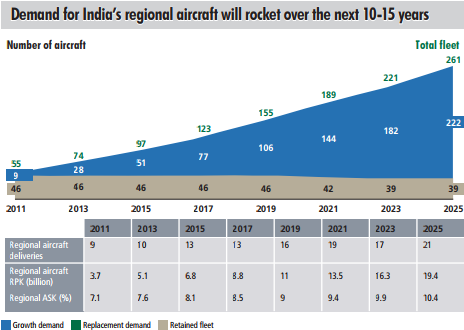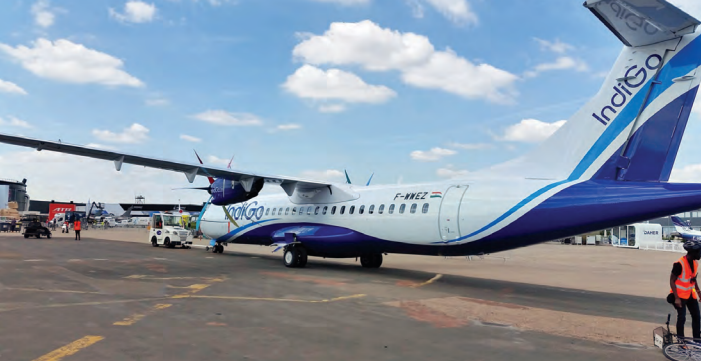RCS Pushes Growing Demand for ATR
AIBM
July - September 2017
The rising demand of airplane seats from Tier-II and Tier-III cities in India has pushed the airlines flying the Indian skies to think of ATR aircraft – the government’s regional air connectivity scheme seems to be hitting the right notes.
ATR, the leading turboprop manufacturer of below 90-seat aircraft was present at the 52nd edition of the Paris Air Show, from June 19 to June 25. The company greeted visitors on board an ATR 72-600 in the colours of the Indian carrier IndiGo. While IndiGo, one of the premium airlines in India looks at the Regional Connectivity Scheme (RCS) of the present government as a major test of character, the latest order of 50 ATR 72-600 aims to address the ambitious regional market in India. Ude Desh Ka Aam Naagrik (UDAN) is the name given to India’s RCS. It aims to boost economic development, employment and tourism by connecting small and remote cities.
IndiGo was currently only operating Airbus A-320 aircraft; however, a statement made by the airline revealed that it had signed a term sheet with French-Italian aircraft maker ATR for purchase of 50 ATR 72-600s, with the flexibility to reduce the number of aircraft based on certain terms. While a term sheet means that the airline has now identified the aircraft that it plans to buy, IndiGo and ATR will firm up issues such as final delivery dates and the number of seats that the airline requires in the aircraft.
Below are the features of the ATR 72-600:
• Passenger capacity: 68-78 seats • Engines: Pratt & Whitney 127M
• Maximum power at take-off: 2,750 horse power per engine
• Maximum weight at take-off: 23,000 kg
• Maximum load: 7,500 kg
• Maximum range with full passenger load: 900 nautical miles (1,665 km)
Christian Scherer, ATR’s chief executive officer, said, “IndiGo is one of the most respected, efficient and demanding airline’s in the world. Today they have selected the ATR 72-600s as the best solution to effectively implement their ambitious plans to build a nationwide regional network. Their decision further proves that our aircraft is the right tool to link communities and develop business throughout India.”
Aditya Ghosh, president of IndiGo, said, “In support of our Prime Minister Narendra Modi’s UDAN vision, we are embarking on a journey to build a nation-wide regional network and connect cities that have not benefitted from the growth in Indian aviation. The ATRs low operating costs will help us build a large regional air travel network with reasonable fares. These aircraft will feature modern cabin interiors, thus making the flight a comfortable experience for our passengers. The ATR’s outstanding operational versatility, along with their capabilities to land in remote airports with limited infrastructure will help us manage our operations efficiently.”
More about ATR 72-600
The aircraft will be equipped with the newest passenger comfort developments for the ATR ‘-600 series’. On board, visitors can discover the ‘innovation corner’, featuring two rows of Geven’s new Neo Classic seats, which will be fitted as standard on ATR -600s in the near future. The aircraft also features two rows of ultra-light Expliseat airline seats. Both Geven and Expliseat’s seats decrease the overall weight of the aircraft (170 kg and nearly 300 kg, respectively). The ATR 72-600 that was put on display at the Paris Air Show will also be equipped with a new on board WiFi streaming system allowing passengers to access a variety of In-Flight Entertainment (IFE) content on their personal electronic devices.
ATR places the continuous development of its aircraft at the core of its business. Besides the new features displayed at the Air Show, ATR is about to receive certification for the new version of its avionics, Standard 3. These new avionics will combine a range of standard and optional features, designed to reduce both pilot workload and ease airline operations; ensuring that ATRs remain at the cuttingedge of technology. Among the new Standard 3 innovations, the ClearVision System is a first in commercial aviation, consisting of a headmounted pilot visor (Skylens) displaying basic flight data, a synthetic vision system plus an enhanced vision system.

Note: RPK is revenue passenger kilometers or total number of kilometers travelled by all passengers; ASK is available seat kilometers. Source: A.T. Kearney analysis
Other Indian Airlines
Jet Airways is one of the other private airlines that have ATR aircraft in its fleet. The airline that has over the years served a number of regional destinations has 15 ATR 72-500 (66-seater) and three ATR 72-600 (72-seater) in its fleet.
Air India, the state subsidised airline of India also has three leased ATR 42-320 aircraft (48-seater). Alliance Air, a wholly owned subsidiary of Air India Limited operates air services to 36 destinations with a fleet of eight ATR 72-600 (70-seater) and two ATR 42-320 (48-seater) aircraft. Alliance Air flights are operated mostly to Tier-II and Tier-III cities, or those that link these cities to the metro hubs. Alliance Air has 350 flight departures per week and 50 flight departures per day.
As India’s airline industry continues to showcase a robust growth in recent years, the short-route traffic of up to 1,000 km has seen a rapid increase in demand. Expansion of fleet remains the imperative choice for the airlines. The regional services are catered by smaller aircraft (60-120 seats) and that is where the ATR 72 turbopop has been the workhorse in the Indian skies.
Wrapping up, the significant growth in the regional airline industry will push ATR for faster, more comfortable and more fuelefficient planes.










